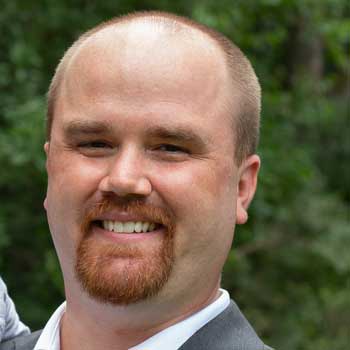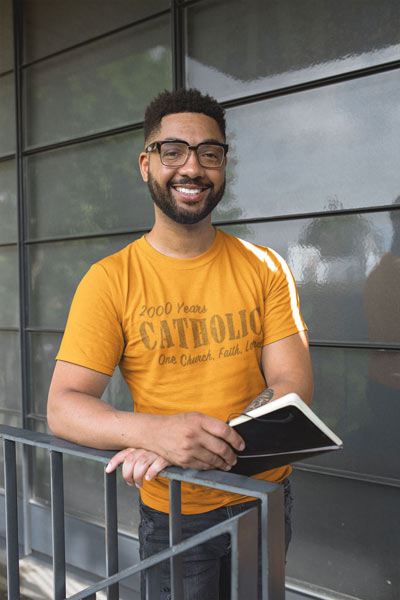
I am often recruited to speak at Confirmation events around the Midwest and, in the past, I would offer a “test” to check the candidates’ understanding of Confirmation. Unfortunately, nearly every student provided an incorrect definition. What is worse, sometimes priests and catechists could not provide a correct definition either. What is the sacrament of Confirmation?
By Brandon Harvey
The Errors in Confirmation Catechesis
An undergraduate professor of mine once said during a course on the sacraments: “The Church is still figuring out what Confirmation is all about.” At the time, I trusted these words of my professor. Then I discovered her error and the wealth of information provided by the Church and realized that the Church was clear about her doctrinal understanding of Confirmation.
I am often recruited to speak at Confirmation events around the Midwest and in the past, I would offer a “test” to check their understanding of Confirmation. Students were asked to provide their best definition for the Sacrament of Confirmation. They would then vote on the best definition by a student. Nearly each student would provide an incorrect definition. To make matters more awkward, the Priest and Catechist in some communities would sometimes also get it wrong. You can imagine why I no longer do this activity.
The most common definitions are as follows:
- Confirmation is the completion of my class requirements. A graduation from religious education.
- Confirmation is when I receive the Holy Spirit for the first time.
- Confirmation is when I receive the Gifts of the Holy Spirit for the first time.
- Confirmation makes me an adult Catholic.
- Confirmation is how I choose the faith that was chosen for me when I was a baby.
- Confirmation activates the sleeping or dormant Gifts of the Holy Spirit from Baptism.
- Confirmation completes the graces of Baptism.
- Confirmation is a special outpouring of the Holy Spirit like at Pentecost.
- Confirmation gives us the strength to spread and defend the faith as witnesses.
It may surprise some to know that numbers 1-6 are not only false, but the most common definitions provided by the hundreds of students during this activity in years past. Numbers 7-9 were provided by me to try and give the truth a chance to be selected during the vote. What about numbers 1-6 is erroneous? I will skip past the first false answer, since it is clearly wrong to those reading this article knowing studying the faith is a life-long journey.
Confirmation and Baptism Confusion
Confirmation is not the first giving of the Holy Spirit or His Gifts. Baptism is when we first receive the Holy Spirit and His Gifts. Jesus commands Baptism to be administered “in the name of the Father, and of the Son, and of the Holy Spirit” (Matthew 28:19, emphasis added). Saint Paul describes Baptism not only as the plunge into the death and resurrection of Christ (Romans 6) but also an encounter with the Holy Spirit (1 Corinthians 12:13, Titus 3:5). This is expressed by the Catechism of the Catholic Church’s treatment of the effects of Baptism.
“The fruit of Baptism, or baptismal grace, is a rich reality that includes forgiveness of original sin and all personal sins, birth into the new life by which man becomes an adoptive son of the Father, a member of Christ and a temple of the Holy Spirit. By this very fact the person baptized is incorporated into the Church, the Body of Christ, and made a sharer in the priesthood of Christ.” -CCC 1279
As Temples of the Holy Spirit, the Baptized have received the Holy Spirit. This explains why the Church can then teach that the Baptized receives from the Trinity the gift of Sanctifying Grace, “giving them the power to live and act under the prompting of the Holy Spirit through the gifts of the Holy Spirit” (CCC 1266). The Holy Spirit and the Gifts of the Holy Spirit are given in Baptism.
The Church uses words like “completes,” “increase,” “deepening” to describe the relationship between Baptism and Confirmation. The Gifts of the Holy Spirit in our life are strengthened and deepened in Confirmation (CCC 1303). A Christian child could not function within the life of grace if the Gifts of the Holy Spirit were only dormant and not coming to life until Confirmation day.
Confirmation and Maturity Confusion
The errors within Confirmation catechesis also express a confusion over the idea of adulthood within the Church. It is not Confirmation but age that determines adulthood in the eyes of God’s Church: “A person who has completed the eighteenth year of age has reached majority; below this age, a person is a minor” (Can. 97 §1). The Church recognizes that Confirmation is “sometimes” called the “sacrament of Christian maturity” (CCC 1308). But the Church is quick to correct the false understanding that this equals an age of adulthood. Quoting Saint Thomas Aquinas, the Church reminds us that “Age of body does not determine age of soul. Even in childhood man can attain spiritual maturity” (CCC 1308).
To strengthen the point a bit further, an unbaptized child in danger of death is to be both Baptized and Confirmed (CCC 1307, Can. 891). In the Eastern Catholic tradition, it is normative for infants to be Baptized and Confirmed in a single liturgy (Eastern Can. 695, CCC 1318). Lastly, the minimum age for Confirmation in the Roman Rite is the age of reason, roughly seven years old (Can. 97 §2). Clearly Confirmation cannot be a rite of passage that confers adulthood.
More importantly, Confirmation must never be taught as an affirmation of the faith that was once chosen by the parents. First, nowhere in the Church’s doctrinal teachings is this language used or even alluded to. It is not Catholic. It is Protestant. Within the ELCA Lutheran communities “Confirmation, which is now commonly called Affirmation of Baptism, is the time when young people declare for themselves that they will live out the promises made for them by their parents and sponsors in their baptism” (LivingLutheran). The Missouri Synod Lutheran communities similarly believe,
Confirmation is a time-honored church tradition (not required by God’s Word, but we believe useful nonetheless) in which the child baptized as an infant is given the opportunity to confess for himself or herself the faith that he or she was unable to confess as an infant.” –LCMS
For Catholics, we affirm our faith in every action we take as Catholics: when we recall and affirm our Baptism when using Holy Water, when professing the Creed at Mass, when in the Confessional, when giving the “Amen” at the moment of Holy Communion, and when we renew our Baptismal Promises each Easter season. There is even a renewal of Baptismal Promises prior to the reception of Confirmation (CCC 1321); this ability for affirmation and renewal of Baptismal Promises is a prerequisite for those receiving Confirmation at the age of reason or later (Can. 889 §2).
Conclusion: What is Confirmation?
There were three correct answers above for the meaning of Confirmation. The lack of understanding among many students, parents, and parish leaders should give pause for concern over the perpetuation of error within Confirmation catechesis. In the last couple years, my travels have provided me opportunities to witness churches teaching the truth about Confirmation thanks to dedicated catechists and pastors, but the errors are common enough, as I am sure most readers have encountered them, that they seem somewhat institutionalized. Yet, the growing majority of catechetical materials and articles are faithful to the Church’s teaching on the Sacrament of Confirmation. It seems that in time the errors in Confirmation catechesis will likely be purged from regions and communities where they are still prevalent.
Confirmation “in a certain way perpetuates the grace of Pentecost in the Church” (CCC 1288). It “is the special outpouring of the Holy Spirit as once granted to the apostles on the day of Pentecost” (CCC 1302). This “brings an increase and deepening of baptismal grace” (CCC 1303). Throughout the Catechism, a theme persists. Besides an emphasis on the Holy Spirit, the Catechism emphasizes Confirmation as an empowerment by the Holy Spirit, like at Pentecost, to spread and defend the Catholic Faith in words and deeds (CCC 1285, 1287, 1294, 1303, 1304, 1305, 1309, 1316, 1319). A good starting point for readiness to spread the faith would be a correct understanding of the Sacrament of Confirmation that one is requesting to receive. The Catechism of the Catholic Church is an excellent starting point for a parent or catechist instructing children in the Sacrament of Confirmation.
Photo Credit: Jean II Restout [Public domain], via Wikimedia Commons.

Brandon Harvey is married and blessed with four children. He studied undergraduate theology and philosophy at Briar Cliff University and received an MA in Theology from Franciscan University. He works as a Catholic speaker, theological consultant, and writer. He has developed the Home Catechesis Podcast and Vlog resource: www.homecatechesis.com




Very timely! A relative is being confirmed this year, and am glad you posted about what it truly is. Also, I had an interesting exchange with a friend who called Confirmation an ‘affirmation of faith’, and I charitably called her on it, that it was actually a protestant way of thinking. Thank you, Mr. Harvey.
Deacon, thank you for this explanation for the Sacrament of Confirmation. Those of us who grew up with the Baltimore Catechism have a clear notion of Grace, sacramental/sanctifying and actual; but, alas, the post Vat. II generations of Catholics haven’t the first idea. How often have we heard “Amazing Grace” sung at Holy Mass and dewy-eyed Catholic are happily inflicted with the very un-Catholic notion that Grace only happens when we first believe. Be nice you give us a good run down the of the Catholic concept of Grace: the whats, whens, hows our souls are impacted by it. ,
This article is heart breaking and shameful. How far we have fallen! How little we care to teach the truths of the Holy Faith. Woe to us Scribes and Pharisees!
Its the same cause. Priests do not catechize.
I taught Confirmation to teens for six years. We had to start from the ground up in all areas of the faith with most of them because most had no idea why they were even there. Most thought that Confirmation was Catholic graduation, bar mitzvah, or affirmation. Some spelled it as “Conformation”. Spelling errors say a lot. They also thought that the Lord’s Prayer was the “Are Father”. Some parents complained that their kids could not even name the seven sacraments after attending classes. Believe me, we taught them. But…when they came to me at 16 years old and had not even the most basic understanding of their faith, their parents expected me to work miracles and provide the catechesis that they as parents never cared to provide, We reinforced constantly that Confirmation was not any of those silly concepts, But even after 2 years of preparation, those teens still could not answer why they were there on the day of the Confirmation Mass. If they aren’t checked in mentally, they will not ever get it unless the Holy Spirit works wonders. Thankfully, our archdiocese now Confirms children in 3rd grade.
With Baptism, by virtue of Sanctifying Grace, we also receive in additional to the “Gifts of the Holy Spirit : the Theological virtues of Faith, Hope and Love; and the Cardinal virtues of Prudence, Temperance, Fortitude and Justice. These are all planted in our Souls as “seeds.” We have to do “our part” before God can make these seeds produce “fruit.”
The confirmation should provide the speaking of toung like the acte 19